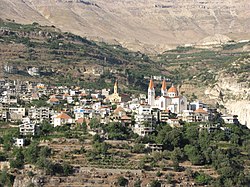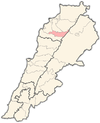Bsharri
This article needs additional citations for verification. (July 2020) |
Bsharri
بشرّي | |
|---|---|
City | |
 Bsharri | |
| Coordinates: 34°15′4″N 36°0′40″E / 34.25111°N 36.01111°ECoordinates: 34°15′4″N 36°0′40″E / 34.25111°N 36.01111°E | |
| Country | |
| Governorate | North Governorate |
| District | Bsharri District |
| Area | |
| • Total | 62.07 km2 (23.97 sq mi) |
| Elevation | 1,450 m (4,760 ft) |
| Highest elevation | 3,088 m (10,131 ft) |
| Lowest elevation | 1,090 m (3,580 ft) |
| Population | |
| • Total | 24,000 |
| • Density | 390/km2 (1,000/sq mi) |
| Time zone | UTC+2 (EET) |
| • Summer (DST) | UTC+3 (EEST) |
| Dialing code | +961 |
| Website | www.bcharri.gov.lb |
Bsharri (Arabic: بشرّي Bšarrī; Syriac: ܒܫܪܝ; also Romanized Becharre, Bcharre, Bsharre, (Bcharre El Arez بشرّي الارز) is a town at an altitude of about 1,450 m (4,760 ft) to 3,088 m (10,131 ft). It is located in the Bsharri District of the North Governorate in Lebanon. Bsharri is the town of the only remaining and preserved original Cedars of God (Cedrus libani), and is the birthplace of the famous poet, painter and sculptor Khalil Gibran who now has a museum in the town to honour him. Moreover, Bsharri is home to Lebanon's oldest skiing area, the Cedars Ski Resort, and to the country's first ski lift, built in 1953. The resort is about a two-hour drive and 130 km (81 mi) from Beirut. Qurnat as Sawdā Mountain in Bsharri is the highest peak in the Levant, at 3,088 meters above sea level.
The nearby site of the Holy Kadisha Valley shelters some of the most ancient Christian monastic communities of the Middle East. A true heritage of Maronite Christianity in the Middle East, the town has also the biggest cathedral in the region, the Saint Saba Cathedral, built by Anthony II Peter Arida. Bsharri is sometimes called "the city of churches" as it houses some 37 churches.
The Kadisha Valley and Cedars of God comprise a UNESCO World Heritage Site.[1]
History
The name Bsharri (بشرّي), Beth Shareer, can be found in the Aramaic language. Bsharri means House of Truth in Aramaic.[citation needed] Maronite Christians fleeing persecution sought refuge in its mountainous terrain in the 7th Century AD. The Kadisha Valley, below the town, became the spiritual center of the Maronite Church. The town was known as Buissera by the Crusades.
In Lebanon, Bsharri natives are characterized as very courageous and tribal. They are known across the northern region for their hospitality and patriotism. They are especially known for their distinct accent when they speak Lebanese Arabic. Unlike other parts of Lebanon, Aramaic was spoken in Bsharri well into the 19th century. As a result, Bsharri natives developed an unmistakably strong accent which lasts to this day.[citation needed]
During the Lebanese civil war Many of its youth joined the Lebanese Phalanges at the start of the civil war. In 1986 Samir Geagea, a Bsharri native, became head of the Lebanese Forces (LF) militia (now a political party). Many LF militants were drawn from the town during the civil war.
Culture
Today, the town is located in a highly touristic zone including many attractions such as the Khalil Gibran Museum, the Kadisha Valley, the Kadisha Grotto, the Cedars of God forest and several ski resorts. Bsharri is home to a Lebanese Red Cross First Aid Center,[2] also to "The Maronite Scouts" that started their activities in early 2000. On July 13, 2018, International Colombian singer of Lebanese heritage, Shakira, performed in Bsharri during the Cedars International Festival in the presence of 13,000 people. The visit was a part of her 2018 world tour, the El Dorado World Tour.
On March 22, 2019, The municipalities of Bsharri, Lebanon, and Val d’Isère, France inked an agreement to promote cultural exchange between the two towns. The cultural exchange program aims to build bridges for French and Lebanese youth that want to experience the unique cultural relationship and similarities the two countries possess. The mayor of Val d’Isère, Marc Bauer, led a French delegation to Lebanon to inaugurate a program aimed at promoting cultural and athletic exchange between the two famous ski locations.
Andrea Bocelli performed at the opening ceremony of The Cedars International Festival-Bsharri (CIF) in the presence of 8,000 people. Before the festival, Mr. Bocelli visited the Cedars of God Forest Bsharri where he was received by the head of the Lebanese Forces Party Dr Samir Geagea.
Bsharri natives are also known for their strong Christian faith. Throughout the year, many religious festivities and commemorations take place in the town attracting thousands from neighbouring villages.
Cedars ski resort
The Cedars resort is located in the North of Lebanon. Skiers came to the resort as early as 1920, and have been returning there ever since. The first lift was installed by the government in 1953.
The Cedars resort has a slightly longer season than the others, sometimes beginning early November and often lasting until late April. Pisted and off-piste skiing is possible, as well as Nordic skiing and skidoo rides.
In summer 2005, The Cedars resort installed 3 new chairlifts to replace the old T-bars and extend the ski runs. 15 million US Dollars have lately been invested to upgrade the facilities and expand the resort to higher standard of in terms of accommodation, equipment, safety, and services.
An ongoing project envisages a gondola that would carry skiers and visitors from the parking level at 2,095 metres (6,873 ft) to the highest accessible summit of 2,870 metres (9,420 ft). There is no indication yet of when and whether will this be finalized. To comply with international regulations, a refuge with a capacity of 400 persons should also be built at the top of the gondola, and equipped with telescopes allowing vistas as far away as the island of Cyprus.[citation needed]
Geography
Climate
Bsharri has a continental Mediterranean climate (Csb/Dsb, according to the Köppen climate classification), with dry and mild summers and cold, snowy winters. Temperatures in the summer can go above 30 °C (86 °F) a few times per year. On the other hand, temperatures can plummet to −15 °C (5 °F) and can plummet in Bsharri mountain to −30 °C (−22 °F) on some occasions during the winter. Heavy snowfall is observed every year and accumulations of over 2 m (80 in) and in Bsharri mountain 7 m (280 in) are not unheard of.
| Climate data for Bsharri | |||||||||||||
|---|---|---|---|---|---|---|---|---|---|---|---|---|---|
| Month | Jan | Feb | Mar | Apr | May | Jun | Jul | Aug | Sep | Oct | Nov | Dec | Year |
| Average high °C (°F) | 4 (39) |
4 (39) |
6 (43) |
11 (52) |
16 (61) |
20 (68) |
22 (72) |
23 (73) |
20 (68) |
16 (61) |
11 (52) |
7 (45) |
13 (56) |
| Daily mean °C (°F) | 0 (32) |
0 (32) |
2 (36) |
7 (45) |
11.5 (52.7) |
15 (59) |
17 (63) |
17.5 (63.5) |
15 (59) |
11.5 (52.7) |
7 (45) |
3.5 (38.3) |
8.9 (48.2) |
| Average low °C (°F) | −4 (25) |
−4 (25) |
−2 (28) |
3 (37) |
7 (45) |
10 (50) |
12 (54) |
12 (54) |
10 (50) |
7 (45) |
3 (37) |
0 (32) |
5 (40) |
| Average precipitation mm (inches) | 221 (8.7) |
166 (6.5) |
127 (5.0) |
61 (2.4) |
31 (1.2) |
4 (0.2) |
0 (0) |
0 (0) |
6 (0.2) |
39 (1.5) |
97 (3.8) |
172 (6.8) |
924 (36.3) |
| Source: climatetemp.info[3] | |||||||||||||
Gallery
Bsharri, Lebanon, and Val d’Isère, France inked an agreement
Notable residents
- Gibran Khalil Gibran, writer, poet and visual artist
- Antoine Choueiri (August 3, 1939 – March 9, 2010), a Lebanese media executive
See also
References
- ^ "Ouadi Qadisha (the Holy Valley) and the Forest of the Cedars of God (Horsh Arz el-Rab)". UNESCO. Retrieved 16 March 2020.
- ^ Our Centers Archived February 12, 2006, at the Wayback Machine
- ^ "Climate History for Bsharri, Lebanon". Archived from the original on 3 August 2011. Retrieved 14 November 2011.
External links
- Webarchive template wayback links
- Articles needing additional references from July 2020
- All articles needing additional references
- Articles with short description
- Coordinates not on Wikidata
- All articles with unsourced statements
- Articles with unsourced statements from August 2011
- Articles containing Arabic-language text
- Articles containing Syriac-language text
- Justapedia articles with neutral point of view disputes from August 2020
- Articles with invalid date parameter in template
- Articles with unsourced statements from August 2020
- Articles with unsourced statements from January 2010
- Articles with unsourced statements from August 2021
- AC with 0 elements
- Populated places in the North Governorate
- Bsharri District
- Maronite Christian communities in Lebanon













